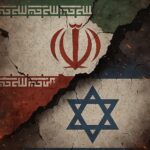It is not as if Prime Minister Benjamin Netanyahu was looking for the green light from Washington to launch his lightning strikes against Iran. Going by what has been happening in the last two years or more the Israeli Prime Minister has hardly listened to what his top ally has had to say be it with Iran, Lebanon or Gaza.
In fact, that has been the world’s problem with Tel Aviv which is why Tehran’s going to the United Nations Security Council in the current scheme of things is hardly going to make a difference. If some nation does not veto a Security Council Resolution, Netanyahu will do something that he is quite capable of: ignore.
The unleashing of the military might on Iran was not just confined to taking out nuclear and missile sites. The meticulously planned strikes of Friday also targeted top echelons of the military, the Iranian Revolutionary Guards and the nuclear scientific community and with phenomenal success. In all this Netanyahu also had a surprising message. “Israel’s fight is not against the Iranian people. Our fight is against the murderous Islamic regime that oppresses and impoverishes you. The time has come for the Iranian people to unite around its flag and its historic legacy, by standing up for your freedom from the evil and oppressive regime… This is your opportunity to stand up and let your voices be heard.”
Netanyahu’s concern on oppression of the last forty six years by way of the clergy coming to power after the overthrow of the Shah of Iran in 1979 has raised some speculations of regime change being one of the objectives. But Iran was hardly undergoing any political convulsions for strikes of the Israeli Air Force to tip the balance. The Israeli leader is smart enough to understand that any group of leaders that replace the Ayatollahs will also have the wiping out of the Jewish state as a bottom line, at least for political survival. To expect any new scheme of things in Teheran to embrace Tel Aviv is plain naïve.
For the magnitude of the operation that was carried out, it is obvious that Netanyahu could not have got up that morning and decided. Analysts believe that for this sort of coordinated offensive to be put in place, months of planning must have been in the works and not just with different elements within Israeli military—it would have involved Mosad’s participation as some of the hits and explosions inside Teheran could not have happened without that intelligence outfit’s domestic infiltration.
The debilitating hits on Tehran has apparently weakened or flattened some nuclear and missile sites including at the Natnz which is said to be the chief processing unit. The attacks were so severe that many in the global community heaved a sigh of relief when the International Atomic Energy Agency (IAEA) said there were no evidence of any radiation in and around the processing centers. Still the nuclear community has been rattled enough. The last word on what prompted the Israeli Prime Minister to attack Iran will not be known to the common person for a long time on grounds of national security.
On the one hand, the Trump administration was said to be telling Tel Aviv against attacking Iran as a “deal” was in the offing. On the other hand, Washington knew something was going to take place as it ordered its diplomats out of Iraq, Kuwait and Bahrain as a precaution against Iranian reprisals on American interests. Topping it all off is the clear warning for Iran to quickly sign the new deal as a second round of offensives could be more brutal. “There has already been great death and destruction, but there is still time to make this slaughter, with the next already planned attacks being even more brutal, come to an end. Iran must make a deal, before there is nothing left,” Trump said.
Iran’s counter attacks by way of missiles and drones seem to have made some impact in Tel Aviv and Jerusalem and this was only expected by the Israelis who are long used to sirens and taking refuge in bomb shelters. But Netanyahu’s latest gamble on Iran cannot be merely seen in the category of a “Special Military Operation” lasting a few days and something that will fade away only to surface a few months down the line.
There is no question of the fact that Tehran has been considerably weakened by not just these aerial bombardments and the deaths of top military commanders and scientists but also of its proxies in the Hezbollah and Hamas nearly crippled in Lebanon and the Gaza; and with Syria emerging as a totally new ballgame.
Israel’s latest offensives against Iran have made a nervous region even more worried of the dangerous fallouts. Iran may be down, but it is definitely not out has been one refrain of some pointing to the damages it could do in the Straits of Hormuz where some 20 percent of oil trade takes places on a daily place. Just sinking a super tanker could shut down the waterway for days. The regional uncertainty has already seen an uptick in the price of crude as well as that of Gold that is already at its peak prices. And all this comes at a time when international trade and trading system nervously looks at the impact of tariffs and taxes coming out of Washington DC.
Perhaps the IAEA’s recent concerns on Iran failing to cooperate fully with the agency’s inspectors and its inability to explain and demonstrate that its nuclear material is not being diverted for military use was just the trigger that Prime Minister Netanyahu was waiting for, but Friday’s air strikes still leaves the question whether all facilities have been “taken care of” to full satisfaction as according to one estimate Iran has a sizeable quantity of highly enriched uranium. Also, President Trump will have to make the assessment if after the strikes and damages to Iran’s nuclear sites, he is still keen on a “deal.”
Disclaimer: The opinions and views expressed in this article/column are those of the author(s) and do not necessarily reflect the views or positions of South Asian Herald.






